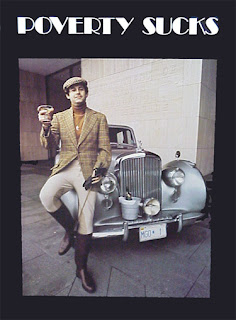
Poor people don't pay taxes.
Poor people own appliances, so poverty doesn't really suck.
Poor people caused the collapse of the housing market and nearly brought down the world's financial markets. (That one was so widespread I won't even bother to look for a link for it.)
The poor, being powerless, have more power than you.
The poor will always be with us, so we'll always have somebody to blame.
Walter Brueggemann reminds me that:
The task of prophetic ministry is to nurture, nourish, and evoke a consciousness and perception alternative to the consciousness and perception of the dominant culture around us. Thus I suggest that prophetic ministry has to do not primarily with addressing specific public crises but with addressing, in season and out of season, the dominant crisis that is enduring and resilient, of having our alternative vocation co-opted and domesticated.Walter Brueggemann, The Prophetic Imagination, Fortress Press, 1978, p. 13.
But he also warns me that:
The task of prophetic ministry is to hold together criticism [for dismantling the dominant consciousness] and energizing [for moving communities of faith with the promise of another time and situation]....Liberals are good at criticism but often have no word of promise to speak; conservatives tend to future well and invite to alternative visions, but a germane criticism by the prophet is often not forthcoming.Brueggemann, p. 14.
These are words that apply to well and accurately to the debates I frequent on the internet: one side criticizes but offers no real promise; the other side worries ceaselessly about the future, and doesn't even tend to it well, but invites alternative visions only of disaster, with no germane criticism of the present except as it is in the hands of the wrong people. So to simply point out that one side blames the poor while the other side ignores them, is not enough; it's barely even a beginning. But I've lamented before that Robert Kennedy would walk among the poor of Appalachia, and no politician today would be seen with any person who might fit the image of "poverty." Indeed:
What’s poverty? Poverty guidelines have not changed since the 1960s: “A family is counted as poor if its pretax money income is below its poverty threshold,” which is $11,161 for a single adult — think about that! — and $17,286 for a couple with one child.And yet the Heritage Foundation insists that poverty is no more, because:
The poverty rate in 1959 was nearing 40 million. It dipped to about 23 million in 1973, only to rise again in the early 1990s to about 39 million. But the poverty rate in America in 2009 was the highest it’s been in the last 50 years, at about 43.6 million.
In 2005, the typical household defined as poor by the government had a car and air conditioning. For entertainment, the household had two color televisions, cable or satellite TV, a DVD player, and a VCR. If there were children, especially boys, in the home, the family had a game system, such as an Xbox or a PlayStation.[4] In the kitchen, the household had a refrigerator, an oven and stove, and a microwave. Other household conveniences included a clothes washer, clothes dryer, ceiling fans, a cordless phone, and a coffee maker.Of course, a picture is worth a thousand words, so:

The simple fact is, appliances once expensive and the province of the rich, are now inexpensive and available to almost everyone. Which doesn't even get to the slippery definition of the "typical household defined as poor." I've been in plenty of poor homes with refrigerators and stoves; mostly they come with the apartments. The poor have access to them, but not ownership of them, and that access runs out when the lease runs out, often within three months. In Texas, at least, that's the typical amount of time the poor have before a landlord can act to evict them for non-payment of rent. I am not far from a school in a "wealthy" school district where many of the students attend class for only three months at a time, because the family is constantly moving. The poor also have access to the internet; if they go to a public library. They can get air conditioning there, too, if they can't pay the electric bill in the apartment they can't pay for. Presumably that makes them rich as well.
It's a matter of perception, then. Especially when we don't like the way the prevailing conversation seems to be going, we deride the notion that perception is reality. But strictly speaking, what else can reality be, except what we perceive? And that is where the prophetic ministry enters in and begins its work: with reminders of what was ("the poor will always be with you") and critique of what is, and what should be ("Lord, when did we see you?"). It begins with changing our perceptions in a dialectic that keeps us between criticism and energizing.
Oh, boy; more hard work! Thanks be to God.
being poor isn't that bad as long as you something to eat and a cool attitude.
ReplyDelete